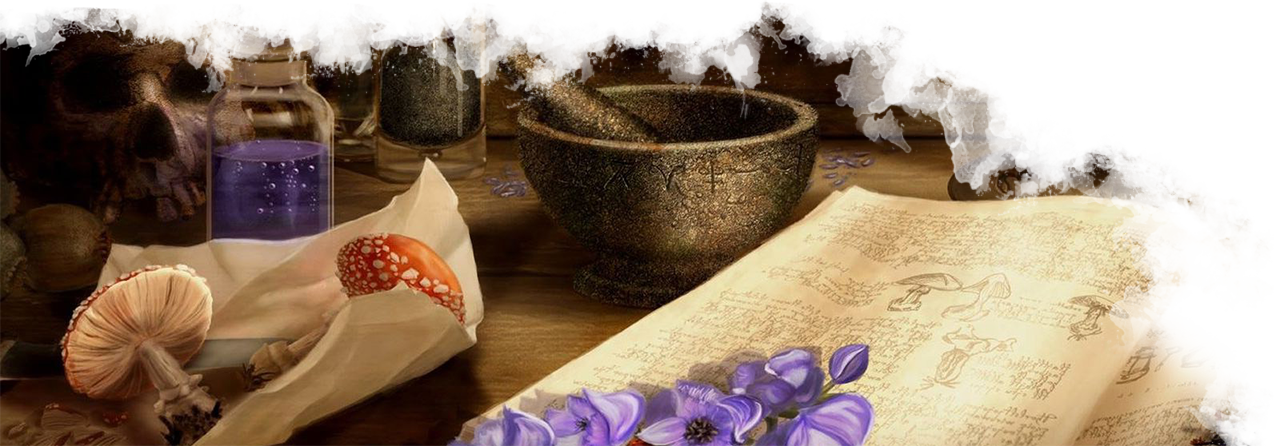Herbalism & Alchemy
Though many career paths are open to villagers, farmers and soldiers alike, one that has repeatedly drawn the interest of adventurer's around the world is the art of herbalism and alchemy. Traveling around the world in order to collect herbs which provide near-magical effects has been the interest of greenthumbs through the centuries. An even more specific subset of scholars learns of alchemical techniques in order to distill these plants into potions for even more powerful effects. The best among these alchemists are often well known for their effective exploits throughout the world.
Split down the Middle
In order to be an effective alchemist, one must also have knowledge on dealing with the various herbs that grow around the world. While it is possible to do one without the other, the most effective alchemists are always those who know exactly what the plants they use as reagents do, and where to find them out in the open.
Herbalism
Most plants that can be found around the world have special properties, even in their unworked form. Since some of these properties can be dangerous indeed, both a knowledge of how to collect ingredients safely as well as the right tools to do so are required.
As a herbalist, you are able to effectively scout for useful herbs whenever you are out in the wilds. To do so, simply tell your DM you want to take this action. They will then ask you to perform a Nature check in order to see if you find anything; the DC for this check is set by the DM, who bases it upon the location in which a herbalist is searching for herbs. Having another character skilled in herbalism assist you will give you advantage on this roll, while characters without any herbalism skills trying to uncover herbs for you will roll with disadvantage.
Once herbs have been located, your DM will either inform you what type of plants they are, or describe their outer features to you if they are of a type you have not previously encountered. To successfully gather any herbs, you will need to have a herbalism kit on you, as well as a minimum of 10 wisdom. If you meet these conditions, you can attempt to gather the herbs by doing a herbalism check:
Herbalism check = d20 + proficiency (if proficient in Herbalism)
When you have made this roll, you obtain a number of the plants you tried to gather. Typically, this will be according to the table below, though in the case of very rare plants the DM may inform you of a different result.
| Result | Amount of plants obtained |
|---|---|
| 1-5 | 1 |
| 6-10 | 2 |
| 11-15 | 3 |
| 16-19 | 4 |
| 20+ | 5 |
Alchemy
When herbs have been obtained, they can be distilled into potions and concoctions: the former are imbibed, while the latter are thrown or applied externally to activate their effects. To make either, an empty vial is required, as well as an alchemist's tools and access to an alchemy workbench. When these conditions are met, an alchemist can add up to 4 plants of any kind to any one potion or concoction. The effect of the brew will depend on what types of herbs are used in it. Using the same type of plant multiple times will increase the effect that herb gives for the potion. Note that not all plants will work together in the same brew, and some herbs may in fact cancel out others. Finally, in order to brew a potion, the alchemist makes an alchemy check:
Alchemy check = d20 + proficiency + intelligence or wisdom modifier (whichever is higher)
The DC for this check increases based on the amount and type of herbs used in a brow and follows the following formula:
Alchemy check DC = 10 + (A, B, C, D) * E, where A, B, C and D are the DCs of the four herbs used and E is the amount of herbs used.
For example: in order to brew a potion with 1 single Sipphine's Weed, the alchemist will have to succeed on an alchemy check with a DC of 10+(1+0+0+0) * 1 = 11. Doing so will result in a minor healing potion that heals for 2d4 when imbibed. Using 3 Sipphine's Weed instead will result in a major healing potion that restores 6d4 health, but the DC for this check will be 10+(1+1+1+0) * 3 = 19 instead.
A brew with merely one Solflower in it will have a similar DC of 11 and result in a concoction that can be thrown at or applied to an object in order to receive the same results as if the Light cantrip were cast on it. A brew with 2 Sipphine's Weed and 1 Solflower will have a DC of 19 to make, and - when imbibed - heal the drinker for 4d4 health while applying a 1 minute effect to them as if they were affected by the Protection from good and evil spell.
In the end, it is up to the alchemist themselves to experiment and find combinations that they feel assist them in their journeys.
